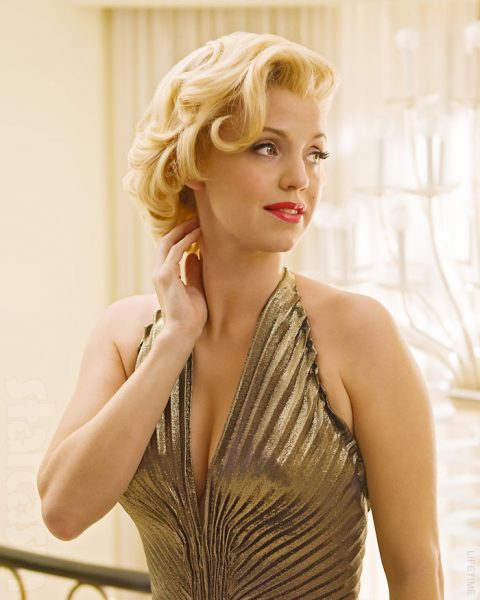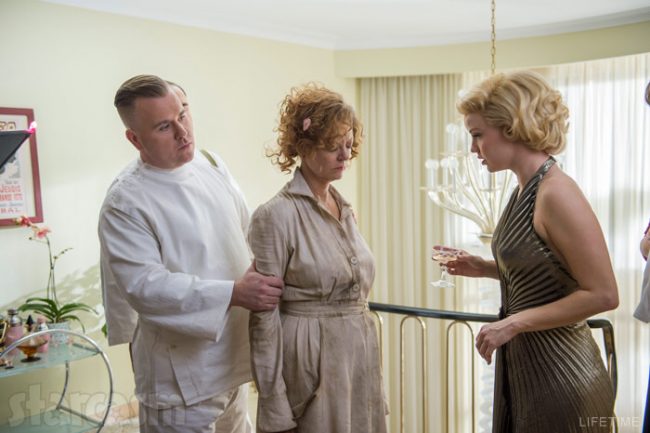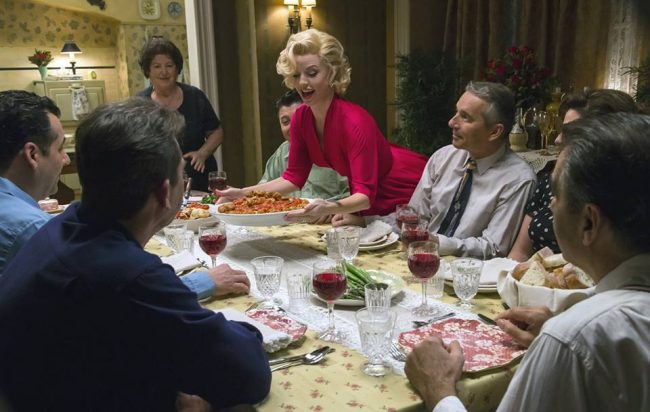
Actresses Kelli Garner and Susan Sarandon – who play Marilyn and her mother, Gladys, in the upcoming mini-series, The Secret Life of Marilyn Monroe, to premiere on the US Lifetime Channel on May 30-31 – have spoken to the New York Daily News about their roles.

“‘It is different because it deals with the relationship with the women in her life, the mother, the schizophrenia, and dives into the personal life with the men in her life, and Marilyn in fictional psychotherapy is a fun idea,’ Garner says in an exclusive interview with the Daily News.
Sarandon’s goal was ‘to try to make [Gladys] a person and find those times where she is aware,’ she says. ‘They describe her as never smiling, being very flat. It was not so easy. She did not want to touch people and to just sit.’
Still, Sarandon makes the most of it, tapping into a complex woman who seemed incapable of joy. In one scene, she methodically shreds the magazine covers Monroe is so proud of gracing.
‘This is a sinful business,’ Gladys tells her daughter. ‘It is not what God intended you to do with your life.’
To chronicle her life from a horrendous childhood to dying of an overdose at 36, the film uses the device of Monroe talking to her latest therapist. She tells him how her mother gave her away when she was two weeks old and how she never met her father.
‘I’ve been going to therapy for years, and to get to use the device that was used, the therapy session, I love the exchange of ideas,’ Garner says. ‘She has just become a really interesting human to me.’
Flashbacks set during the Depression show an unkempt blond girl who bounced around family friends and orphanages. Monroe married at 16 when her mother’s friend, a steadying influence, would no longer keep her.
As she tells her story to the shrink, Monroe can’t help herself from striking seductive poses. Garner nails Monroe’s physicality, how she just oozed sex even when doing the most mundane tasks. To copy her moves, Garner watched Monroe’s movies.
‘I watched so much and I stared at so many photographs,’ Garner says. ‘She’s a little tease, a total flirt. One of my favorite photos of Marilyn is she is sitting on a couch with a 12-year-old boy. And he couldn’t be happier and she is flirting with this little boy with this dynamic smile on her face, which always made her child come out. They say 90% of communication is nonverbal and I feel like she is a genius of nonverbal communication.’
Garner and Sarandon, separately, recall their introduction to Monroe was watching Some Like It Hot on TV.
‘I remember thinking it was very funny,’ Sarandon recalls. ‘Coming of age, until I knew more about the complexity of Marilyn Monroe, I kind of blamed her for the dive women’s identity took at the time. We had come out of these periods, Katharine Hepburn and Bette Davis and Ingrid Bergman, people you saw in movies so strong and quick, and suddenly that was no longer the goal. And vulnerability was what defined sexuality or defined attractiveness.’
She pauses and adds, ‘She was a great comedic actress and so beautiful and even then, before I knew that much about her, she seemed to have gotten caught in this persona that was working for her and she was maybe outgrowing. That feeling that she was setting back what women were about; I had very mixed feelings about her and her place in history as I was growing into a woman.’
‘She was so smart in a time where we didn’t know how to categorize her kind of intelligence, which was intuition,’ Garner says. ‘She wanted to learn. She was a hard worker. She really loved and needed to be validated and loved.’
Ultimately, of course, Monroe’s demons did her in. But Sarandon dismisses the conspiracy theories that she was murdered.
‘I don’t understand how she lived as long as she did because she was mixing so many difficult drugs,’ Sarandon says. ‘I don’t think anyone had to kill her. She was so hell-bent on killing herself.’

Meanwhile, actor Jeffrey Dean Morgan has discussed his performance as Joe DiMaggio in an interview with Variety:
“So you went from a Western to playing one of the most famous baseball players of all time. (And, in between, did the Robert De Niro film Bus 657).
That’s right. A big Italian-American by the name of Joe DiMaggio … Look, it’s not a Joe DiMaggio story. It’s the Marilyn story. I’m an arm piece. I kind of help the story go along, but it’s very much the Marilyn story that I think Kelli Garner pulls off with aplomb. She’s really good in it. And of course, Susan [Sarandon] and Emily [Watson, who plays Marilyn’s foster mother Grace]. These are some fine actors.
I watched a documentary with Joe and Marilyn. I was so fascinated with this couple that had such a tumultuous relationship and yet, they were supposed to be remarried on the day that she died. He never married again. He visited her grave every single day for the rest of his life. Watching that documentary made me say yes to doing the movie because I was so fascinated with that love. They couldn’t hardly be in the same room together, but they couldn’t be apart.
She was married several times …
… But she always ended up back with Joe. The Arthur Miller [marriage] is probably very fascinating; that’s the one I might be more interested in. But the DiMaggio one: There’s so much passion, and he was Joe DiMaggio! They met at the height of their lives. Joe was around during all of the Kennedy stuff, so you know who she was going to. Having him deal with that aspect of her life and still be in love with her …
What he did to her, there was some physicality with her from what I understand … he pushed her around a little bit, but they always went back. That, to me, is very fascinating. That is a love that I would like to be able to tell.”